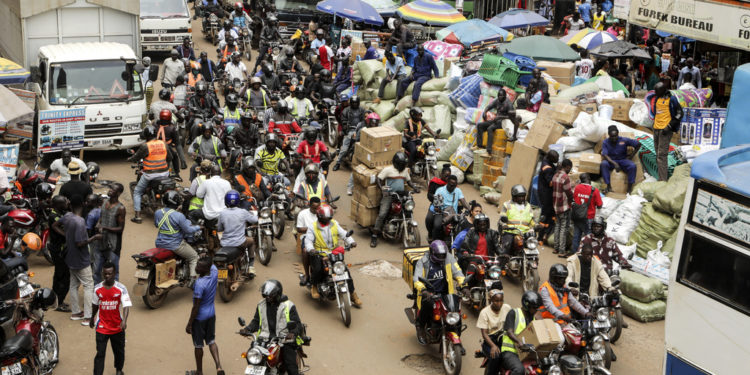In the recent past, agricultural products like coffee, Vanila, moringa, tea, etc. majorly cash crops have supported Ugandan households arguably poised for greatness just lucked foreign marketing and local support. But times are a-changin’, and so is the Ugandan economy.
Today all signs show it’s a boda boda era, where helmets are crowns, two wheels are more than enough, and every rider is a potential breadwinner to a household.
Kampala, the throbbing heart of Uganda, currently boasts a staggering 820,000 boda bodas zooming through its chaotic streets, serving a population of around 3 million residents of Kampala and Wakiso . With a public transport system that consists of one train running from Mukono to Kampala — accommodating a mere 600 passengers — it’s little or no wonder the boda boda has become king of the streets.
Interestingly, acquiring a boda boda isn’t the Herculean task you’d expect. For as little as 300,000 to 500,000 Ugandan Shillings ($80–$135), you can secure one on a down payment plan. Of course, you’ll eventually pay double its market price, up to 10 million shillings ($2,700), which is enough to make any potential rider question if they should have taken up gardening instead, but our brothers have sold gardens to buy boda bodas.
And let’s not even get started on the interest rates; they make you think the lenders are calculating in dog years.
Despite the high cost of ownership, the boda boda business thrives. It supports over 700,000 households and contributes significantly to the nation with about 4.1% of Ugandas GDP. While exact numbers are elusive, let’s just say boda bodas deserve to have a member in Parliament.
Despite being an undeniably lucrative money lending business, the boda boda financing scene isn’t regulated by UMRA or Bank of Uganda. This legal loophole has led to tales of woe from riders decrying unfair lending terms and draconian repayment practices. Missing a payment is reason to reposes your motorcycle even if you are left with 2 weeks to complete the loan, you lose the 2 or 3 years of payment and struggle, majority of boda riders being illiterate you find them near Mogo office holding their helmets thinking of what their children will eat at night with no where to turn, no one to help.
Companies like SafeBoda have done their best to bring order to the chaotic landscape by organizing the sector with apps, safety training, and formal identification systems.
Well, according to riders, “baluzungu nyo” and many riders aren’t tech-savvy, making adoption slower than a snail on strike.
But there’s no denying that digital platforms carry immense potential for streamlining operations, improving rider safety, and making the entire system more accountable.
To inject a semblance of order, various strategies should be implemented by authorities, like the Ministry of Kampala KCCA or even the President’s office (which has already begun gifting bazukulu—youth—with boda bodas). Here’s my wishlist of proposed reforms:
1. Encourage Local Manufacturing: Restrict imports and support a local Investor to manufacture Mortocycles from Kapeeka or Kotido Industrial Area. Why pay Indian investors to sell us back our own roads?
2. Strengthen Rider Associations: Existing leadership structures should be supported to organize riders into SACCOs, and to craft policies and practices to guide their operations.
3. Mandatory Registration and IDs: A digital database of riders would help streamline operations and promote accountability. Just imagine a boda boda rider with an ID badge and a customer can search online and know details of the rider, safe, right?
4. Safety Measures: Every rider should have PPE’s, insurance, and access to customer handling and defensive driving trainings. If a boda boda rider can dodge potholes, they deserve at least a certificate in ‘Urban Obstacle Navigation’ these trainings can be organized by Ministry of Works supported by boda boda leadership or KCCA
5. Cross-Division Regulations: Restricting cross-division travel without permits could help with security and curtail criminal activity. Sorry, no more spontaneous ‘cross-city tours’ for those looking to escape the watchful eyes of their neighborhood but there will be more boda where that drops you, besides, this will help with fare regulation in future.
6. Expand Opportunities: Riders could diversify their income with additional services like courier services , cargo transport, or even agricultural ventures like growing coffee or rearing chicken. This can be spearheaded by The office of the president
7. Enforcement Reform: Current enforcement practices sometimes resemble wrestling matches, which, while entertaining, put both the rider and passenger at risk. Streamlining this could keep everyone safe.
The transformation from an agricultural economy to a boda boda economy underscores the resilience and adaptability of Uganda’s workforce. While the industry is chaotic and rife with challenges. It’s what we are left with, it also offers untapped potential and sustains thousands of livelihoods. With better regulation, support, and training, this two-wheeled titan could take Uganda not just through the streets of Kampala, but straight into a brighter economic future.
Now, who’s up for a ride?
The writer is a rider.
[email protected]






Discussion about this post